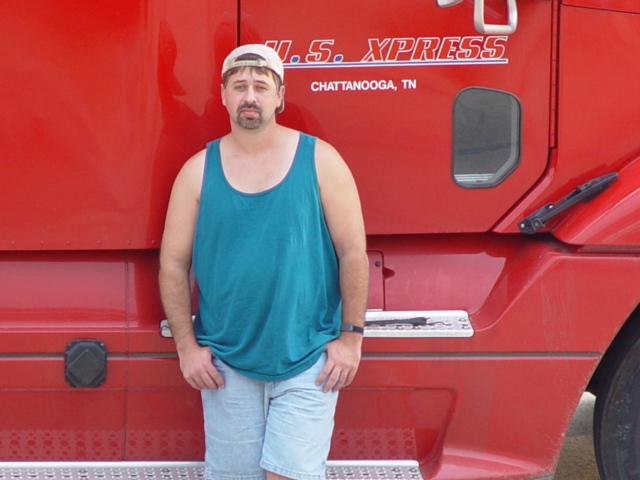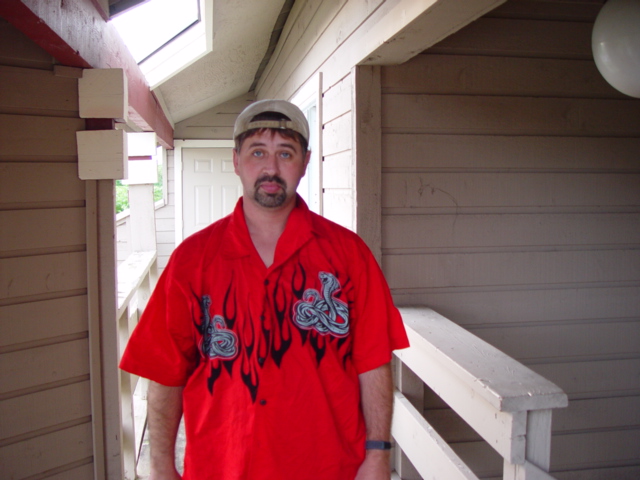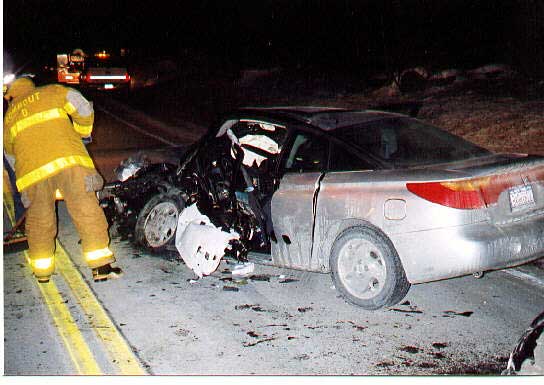


|
I
am currently a truck driver for U.S. Xpress, and its my intent to help
make America's roadways become safer. If any of my advice sounds
good to you please give me your feedback, and share this advice with
everyone you care about. Also call your law enforcement officials and
report dangerous drivers, and you can also report big rigs to their
companies if they are driving in an unsafe manner. Write your
representatives in government and the D.O.T to have much stiffer punishments for drivers that pose a threat to us all (i.e. $5000 for 5mph over legal speed and up from there). Maybe we can curb their bad driving habits by taking money from their wallets. Also I want to help raise money for charities by doing a fund raising walk around the continental United States using the closest roads to our borders. Watch this site for future updates, postings and statistics.
|
|
Driving Safer
|
| Courtesy, Patience, Being Alert, and Planning |
1) Do not speed,
not even a couple MPH's. If everyone else seems to be passing you
and you think you're slowing them all down, does them being wrong make it right for you to drive wrong. When you speed even a
little you contribute to the problem. Could you have a clear
conscience if you were in an accident when you were going only 2MPH
over the limit. Say you hit a pedistrian or smashed into another car
making a turn. Could you live with the knowledge that if you hadn't
been speeding you would not have been in the accident and be
responsible for someones injuries or even death, because the fact is
you wouldn't have been in the spot where the accident happens when it
does if you were driving responsibly. Even if you get in an accident
while driving the legal speed, at least you would have that clear conscience.
Sure you might be sorry, but at
least you would be doing the driving
right.

|
| 2) Don't tailgate, ever. Tailgating is anytime the driver is following too close and isn't certain they can stop in time if they have to. How many accidents have you driven by where the guilty driver probaly thought they could stop if they had to by slamming on the brakes? This is a stupid and very dangerous habit a lot of people do without even thinking about it. If you don't know for certain you have a comfortable stopping distance from the vehicle in front of you, then you don't have adequete braking distance. There are 4 parts to braking. First is seeing that you have to slow or stop, second is your reaction time applying your brakes, third is brake lag (the time it takes for your brakes to work, fourth is the actual time it takes you to stop or slow enough to avoid an accident. |
| 3) Using the 5 part Smith System. |
A] Aim High in steering. This is where you look as far down the road as you can. Most car drivers only look directly in front of them in the area they will cover in the next 2 seconds. Instead you should try to see 15 seconds or more down the road, is there construction, do the police have someone pulled over on the shoulder, is there a brokedown vehicle, are the cars in front of you stopping, is there merging traffic. Be prepared for what you see and change lanes if necessary as soon as safely possible. |
| B] Getting the Big picture. What is happening to your rear and sides? Use your mirrors and turn your head as needed to see what is happening around you. Is there an idiot speeding and changing lanes a lot, or maybe an emergency vehicle trying to trying to get to an accident. |
| C] Keep your eyes moving to avoid road hypnosis and keep yourself sharp and alert. What's your speedometer say your speed is, check your mirrors at least every 3 seconds, is your car overheating. Also helps you keep your peripheral vision sharp, this is your first alert system. |
D] Leave yourself an out. Create (I mean this literally, you have to make your own defensive driving area) your own space cushion around you so you can either stop in time or change lanes to avoid an accident. An island of calm in the hectic stream of traffic. Traffic isn't as stressful if you create your own safety zone. |
| E] Make sure they see you. Use your turn signals when making lane changes, take 10 seconds to do the lane change cause you always have time for safety. Also look around you to make sure the lane is clear when doing so. Make eye contact with other drivers so they are aware of you. |
| |
| You can remember the Smith System by saying the acronym All Good Kids Love Milk |
| AIM High in steering |
| Getting the big picture |
| Keep your eyes moving |
| Leave an out |
| Make sure they see you |
| 4) Expect stupid drivers, but don't drive stupid yourself. They are out there, and you have to watch for them constantly. Don't let them surprise you. |
| 5) When merging
into traffic use the straightaway part of the the ramp for accelerating
to road speed if possible (that is why its called an acceleration
lane). Many people think they have to drive the speed on the caution
sign to the end of the ramp, this is dangerous in the extreme. Cause
if a driver tries merging with 70MPH traffic while they are doing 35MPH
they will create a major hazard to the faster traffic to avoid as well
as
slowing the cars following them on the ramp. A car going 70 rearending
a car doing 35 is a lot worse than if you you are almost up to road
speed. This is equivilant to both cars hitting a wall at 35 MPH. |
| 6) Think on how much time will actually be saved by driving dangerously and weigh the risks against the gains. At most you might make it just 2 minutes quicker for all the problems you made for other drivers while driving across town or on a 20 minute trip. You also cut down on your reaction time. If you're driving a 500 mile long trip 5mph faster than posted speeds, you will only gain maybe 20-50 miles extra after a 10 hour day, and the dangers you create aren't worth risking someones life for that. |
| 7) Use proper planning instead of speeding. Wake up early enough to arrive timely and safely, instead of hitting your snooze a few times. Even if there is an emergency someone close to you is having, they would rather have you arrive safe than die getting there. Take time for safety. |
| 8) No matter how familiar you are with a road, there are many varibles that can change it everyday. Construction, weather, breakdowns, walkers, animals crossing, etc. Always be alert to these changes. See what is really there, not what you expect. |
| 9) Don't wait til the last second to make lane changes. If you see a need to change lanes then change as early as you can. This will save you a lot of hassels, especially at construction zones (remember the construction workers are working to make everything better for all drivers). If you wait til the last moment you make more problems for everyone, yourself included. AND NEVER PASS ON HILLS OR CURVES OR WHEN YOU DON'T HAVE VISIBILITY. |
| 10) If you see a big rig trying to change lanes, either slow down or speed up to let them, cause they are probably trying to avoid a hazard only they see. |
| 11) Courtesy, Patience, Being Alert, and Planning are the best virtues of a safe driver. |
| 12) Know your route ahead of time if possible. If you miss your turn, go up the road and turn back around safely, then go back to your turn. If you act erratically just cause you are in the wrong lane and stop or jump lanes to make a turn, you are being more hazardous for everyone than you might realize. Once more use planning instead of speed to get where you need to go, even if you're running late. |
| 13) Don't let
even heavy traffic intimdate you. No matter how large the city is, you
are only having to deal with a small amount of traffic at any one time,
but don't forget the Smith System. If you're not confident of
your abilities in traffic, then you really shouldn't be driving at that
time. Timid drivers driving way below the speed limit can be be
almost as deadly as the speeders. |
| 14) Instead of joining the insanity of rush hour traffic and raising your stress and blood pressure or having road rage, avoid it all by going shopping, taking a walk, going to a gym, grabbing something to eat, seeing a movie or whatever just so long as you avoid the difficulty of rush hour. You'll feel better and enjoy it more and when you do drive home or elsewhere the traffic flow will be more manageble and flowing smoother (also has added benefit of saving you gas). |
| 15) Its dangerous to just hang out beside 18 wheelers. If you're doing so, you are more than likely in their blind spots. Think on this as well, if the tire beside you blows out, it can do a lot of damage to your vehicle. |
| 16) When passing a semi make sure you don't get back in their lane too soon. Complete your lane change only after you have a good 7 second lead on the truck. This can save your life. Doing this allows them a safer braking distance. |
| 17) In heavy traffic drive the speed limit or just a little under it so you will be slower than the rest of the traffic. This will help you make your space cushion for safe manuevering or braking. Let the traffic flow around you. This also helps you keep moving at a steady pace and conserving your fuel, while reducing unnecessary headaches for you. |
| 18) Know how to signal properly. Signal your intentions a few seconds before you make any lane changes or turns. Give other drivers time to be aware of what you are wanting to do. If you just flip on a blinker then immediately make your turn or lane change then you're being stupid and making a more risky situation for all (this is major characteristic of tailgaters). |
| 19) Please for all the other people sharing the road with you, use a hands free kit for cell phones. You should have both hands on the wheel at 10 and 2, as well as having them free for signaling. Also try not to do other things that can distract you from your driving safe which is your primary responsibility while you are behind the wheel. If you do have to focus your attention away from traffic please wait til there is a safe time and space to do so. This includes but is not limited to the following examples: answering the cell phone, playing with the radio or tempature controls, looking at a map, lighting a cigarette, disciplining children, eating or drinking something. |
| 20) If you don't have to drive in bad weather don't. If you do have to drive somewhere in inclement conditions remember to drive much slower. Always take into consideration the road conditions. |
| 21) When someone is going to pass you, and you can tell they're going almost the same speed as you slow down or just tap your brakes to let them make their pass quicker. Its just a polite courtesy and helps traffic move better. |
| 22) Here are some defensive driving tips if its possible you're going to wreck. |
| Steer Right. A lot of wrecks would be avoided if only one driver does this. If there is a shoulder use it. |
| Avoid head on collisions if at all possible. Its better to drive off the road (except if its a bridge, cliff or high hill) than smack headon or rearend another vehichle, or hit at an angle at least if you can't avoid the wreck. |
| Its better by far to drive off the road or to hit a stationary object or one driving the same direction is best (even though you will probably be found at fault, you will at least have a lot better chance of surviving). The laws of physics and motion will prove this. Two cars hitting headon at 60MPH each have and impact equal to 120MPH. If you can safely drive of the road you might have no bigger problem than getting stuck. Even hitting a tree or boulder is better than the combined force of a headon collision. Your best choices in order are 1) Drive right off the road 2) Hit a stationary object 3) Hit a vehichle going your direction if you're trapped in your lane by another car (even if you are likely to be charged with the accident) 4) Make the oncoming car hit you a glancing blow by angling your car to their right or left but not broadside. |
| 23) Remember
speeding and tailgating are the 2 most dangerous habits to have while
driving and the easiest to avoid doing yourself. NEVER DRIVE DRUNK OR IMPAIRED. This
should go without having to be said, but your perceptions and judgement
aren't up to the challenges presented by driving, so keep your stupid
butt off the road.
. 
|
 Sign
Guestbook
View
Guestbook
Sign
Guestbook
View
Guestbook